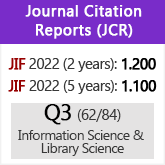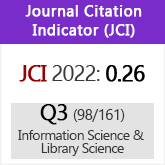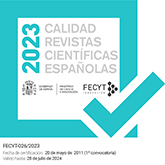Influence of the production of new knowledge and postgraduate theses over the categorization of research groups in Social Sciences: a Decision tree applied to the Colombian scientific model
DOI:
https://doi.org/10.3989/redc.2018.4.1547Keywords:
scientific production, PhD thesis, social sciences, research groups, articlesAbstract
This study assess the productivity of 168 Colombian research groups in social sciences, according to their production of new knowledge (articles included in Web of Science, Scopus and other indexes, books and chapters of books) and human capital (master’s and doctoral theses). The production influence in the categorization of the groups in the Colombian scientific model was identified throughout an analysis of classification trees. The production of books is still frequent in this field of knowledge, although it does not significantly influence in the categorization; the most representative products were the articles indexed in WoS or Scopus, along with doctoral theses. Even though the Colombian scientific model includes a variety of products, the classification of research groups privileges the production collected in international databases, which is not a common practice in Social Sciences.
Downloads
References
Aldana, E. (2010). El rol de las universidades en el desarrollo científico-tecnológico: 1998–2007. Chile: Centro Interuniversitario de Desarrollo (CINDA).
Archambault, E.; Vignola-Gagne, E.; Côté, G.; Larivière, V.; Gingrasb, Y. (2006). Benchmarking scientific output in the social sciences and humanities: The limits of existing databases. Scientometrics, 68(3), 329–342. https://doi.org/10.1007/s11192-006-0115-z
Becker, D. A.; Chiware, E. R.T. (2015). Citation Analysis of Masters' Theses and Doctoral Dissertations: Balancing Library Collections with Students' Research Information Needs. The Journal of Academic Librarianship, 41(5), 613–620. https://doi.org/10.1016/j.acalib.2015.06.022
Breiman, L.; Friedman, J. H.; Olshen, R. A.; Stone, C. J. (1984). Classification and Regression Trees. Belmont, CA, EEUU.: Wadsworth International Group.
Bucheli, V.; Díaz, A.; Calderón, J.; Lemoine, P.; Valdivia, J.; Villaveces, J.; Zarama, R. (2012). Growth of scientific production in Colombian universities: an intellectual capital-based approach. Scientometrics, 91(2), 369– 382. https://doi.org/10.1007/s11192-012-0627-7
Colciencias - Departamento Administrativo de Ciencia, Tecnología e Innovación (2014). Modelo de medición de Grupos de Investigación, Desarrollo Tecnológico o de Innovación y de reconocimiento de investigadores del Sistema Nacional de Ciencia, Tecnología e Innovación, a-o 2014. Bogotá D.C.: Dirección de Fomento a la Investigación.
Colciencias - Departamento Administrativo de Ciencia, Tecnología e Innovación (2015). El Estado de la Ciencias en Colombia. Disponible en: https://sites.google. com/a/colciencias.gov.co/estado-de-la-ciencia-2015/ [Consultado 23/02/2017].
Colciencias - Departamento Administrativo de Ciencia, Tecnología e Innovación. (2017). Modelo de medición de grupos de investigación, desarrollo tecnológico o de innovación y reconocimiento de investigadores del sistema nacional de ciencia tecnología e innovación a-o 2017. Disponible en: https://goo.gl/COU4ey [Consultado 10/09/2017].
Daud, A.; Ahmad, M.; Malik, M.S.I.; Che, D. (2015). Using machine learning techniques for rising star prediction in co-author network. Scientometrics, 102(2), 1687- 1711. https://doi.org/10.1007/s11192-014-1455-8
Fernández-Cano, A.; Torralbo, M.; Vallejo, M. (2011). Time series of scientific growth in Spanish doctoral theses (1848–2009). Scientometrics, 91(1), 15-36. https://doi.org/10.1007/s11192-011-0572-x
Gantman, E. R. (2011). La productividad científica argentina en Ciencias Sociales: Economía, Psicología, Sociología y Ciencia Política en el CONICET (2004-2008). Revista Española de Documentación Científica, 34(3), 408-425. https://doi.org/10.3989/redc.2011.3.829
Giménez-Toledo, E.; Román-Román, A. (2009). Assessment of humanities and social sciences monographs through their publishers: A review and a study towards a model of evaluation. Research Evaluation, 18(3), 201–213. https://doi.org/10.3152/095820209X471986
Giménez-Toledo, E., Tejada-Artigas, C.; Manana-Rodriguez, J. (2013). Evaluation of scientific books' publishers in social sciences and humanities: Results of a survey. Research Evaluation, 22(1), 64-77. https://doi.org/10.1093/reseval/rvs036
Hicks, D. (2004). The four literatures of social science. En: Handbook of quantitative science and technology research, pp 473-496. Kluber Academic.
Huang, M.H.; Lin, C.S. (2011). A citation analysis of Western journals cited in Taiwan's Library and Information Science and History research journals: From a research evaluation perspective. Journal of Academic Librarianship, 37(1), 34-45. https://doi.org/10.1016/j.acalib.2010.10.005
Ibarra, A.; Castro, J.; Barrenechea, J. (Eds.). (2006). La evaluación de la actividad científica en Ciencias Sociales y Humanidades. Servicio editorial de la Universidad del País Vasco. Euskal Herriko Unibertsitatea Argitalpen Zerbitua.
Larivière, V.; Sugimoto, C.R.; Cronin, B. (2012). A bibliometric chronicling of Library and Information Science's first hundred years. Journal of the American Society for Information Science and Technology, 63(5), 997– 1016. https://doi.org/10.1002/asi.22645
Low, Y.; Ng, K. H.; Kabir, M. A.; Koh, A. P.; Sinnasamy, J. (2014). Trend and impact of international collaboration in clinical medicine papers published in Malaysia. Scientometrics, 98(2), 1521–1533. https://doi.org/10.1007/s11192-013-1121-6
Nederhof, A. (2006). Bibliometric monitoring of research performance in the Social Sciences and the Humanities: A Review. Scientometrics, 66(1), 81-100. https://doi.org/10.1007/s11192-006-0007-2
OCyT - Observatorio Colombiano de Ciencia y Tecnología (2016). Indicadores de ciencia y tecnología. Bogotá, Colombia.
RICYT – Red de Indicadores de Ciencia y Tecnología Iberoamericana e Interamericana– (2015). Indicadores Bibliométricos. Disponible en http://www.ricyt.org/ comparativos-sp-469065143 [consultado 30/07/2017].
RICYT – Red de Indicadores de Ciencia y Tecnología Iberoamericana e Interamericana– (2016). Estado de la ciencia en Colombia. Bogotá: Colciencias.
Rosario-Sierra, M.; Sánchez-Perdomo, R.; Herrera-Vallejera, D.; Rodríguez-Sánchez, Y. (2017). Patrón de citas de la producción científica en Ciencias Sociales y Humanidades. Un análisis a partir de Scopus (2000- 2012). Ciencias de la Información, 48(1), 37-44.
Rosenberg, Z. (2015). Citation Analysis of M.A. Theses and Ph.D. Dissertations in Sociology and Anthropology: An Assessment of Library Resource Usage. The Journal of Academic Librarianship, 41(5), 680–688. https://doi.org/10.1016/j.acalib.2015.05.010
Rueda-Barrios, G.; Rodenes-Adam, M. (2016). Factores determinantes en la producción científica de los grupos de investigación en Colombia. Revista Española de Documentación Científica, 39(1): e118. https://doi.org/10.3989/redc.2016.1.1198
Sánchez, R.; Blázquez, M.; Montesi, M.; Botezan, I. (2017). La producción de tesis doctorales en España (1995-2014): evolución, disciplinas, principales actores y comparación con la producción científica en WoS y Scopus. Revista Española de Documentación Científica, 40(4): e188. https://doi.org/10.3989/redc.2017.4.1409
Sanz-Casado, E.; Filippo, D. de; García Zorita, C.; Efraín- García, P. (2011). Observatorio IUNE: una nueva herramienta para el seguimiento de la actividad investigadora del sistema universitario español. Bordón. Revista de Pedagogía, 63(2), 101-116.
Shin, J.; Cummings, W. (2010). Multilevel analysis of academic publishing across disciplines: research preference, collaboration, and time on research. Scientometrics, 85(2), 581-594. https://doi.org/10.1007/s11192-010-0236-2
Steinberg, D. (2009). CART: Classification and Regression Trees. En: Wu, X.; Kumar, V. (eds.), The top ten algorithms in data mining. Boca Raton, FL.; USA: Chapman & Hall/CRC Taylor & Francis Group. https://doi.org/10.1201/9781420089653.ch10
Thompson, J. B. (2005). Books in the digital age. The Transformation of academic and higher education publishing in Britain and the United States. Cambridge, UK: Polity.
Vélez-Cuartas, G.; Gómez-Flórez, H.; Úsuga-Ciro, A.; Vélez-Trujillo, M. (2014). Diversidad y reconocimiento de la producción académica en los sistemas de evaluación de la investigación en Colombia. Revista Española de Documentación Científica, 37(3): e056. https://doi.org/10.3989/redc.2014.3.1133
Vélez-Cuartas, G.; Lucio-Arias, D.; Leydesdorff, L. (2016). Regional and global science: Publications from Latin America and the Caribbean in the SciELO Citation Index and the Web of Science. El Profesional de la Información, 25(1): 35-46. https://doi.org/10.3145/epi.2016.ene.05
Verleysen, F. T.; Engels, T. C. E. (2014). Barycenter representation of book publishing internationalization in the Social Sciences and Humanities. Journal of Informetrics 8(1), 234-240. https://doi.org/10.1016/j.joi.2013.11.008
Vessuri, H.; Sonsiré, M. (2010). Institutional aspects of the Social Sciences in Latin America. En: World Social Science Report. Knowledge Divides. (pp. 59-62). Paris: International Social Science Council and UNESCO.
Published
How to Cite
Issue
Section
License
Copyright (c) 2018 Consejo Superior de Investigaciones Científicas (CSIC)

This work is licensed under a Creative Commons Attribution 4.0 International License.
© CSIC. Manuscripts published in both the printed and online versions of this Journal are the property of Consejo Superior de Investigaciones Científicas, and quoting this source is a requirement for any partial or full reproduction.All contents of this electronic edition, except where otherwise noted, are distributed under a “Creative Commons Attribution 4.0 International” (CC BY 4.0) License. You may read here the basic information and the legal text of the license. The indication of the CC BY 4.0 License must be expressly stated in this way when necessary.
Self-archiving in repositories, personal webpages or similar, of any version other than the published by the Editor, is not allowed.

















